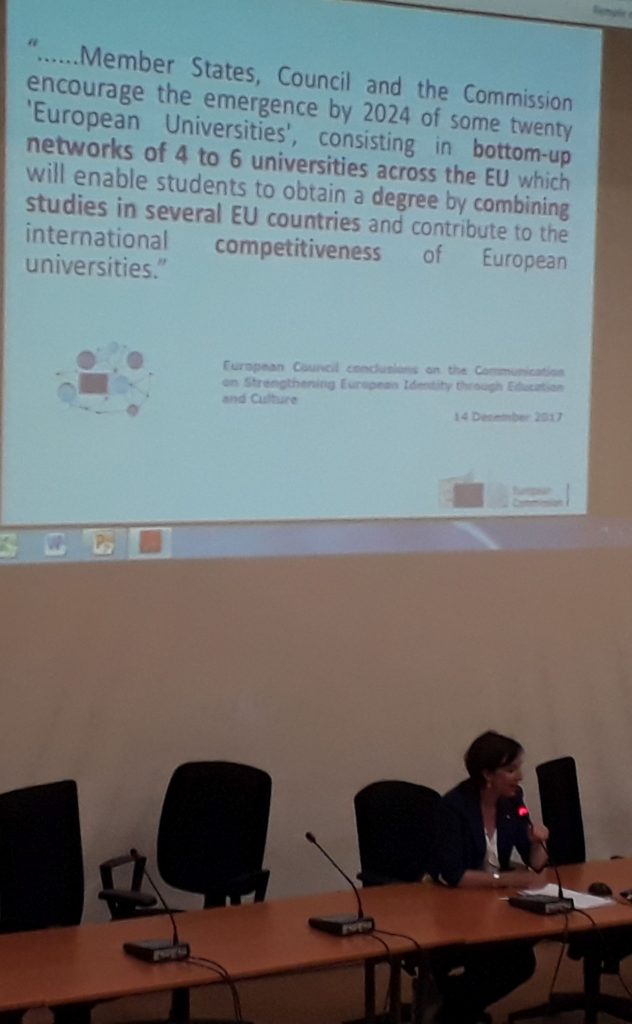Report on meeting “European Universities initiative”, Paris, 2 July 2018
25 July 2018
By Prof. Ludovic Thilly, University of Poitiers, Chair of the Coimbra Group Executive Board
On 2 July 2018, at the French Ministry of Higher Education, Research and Innovation in Paris, Ms Vanessa Debiais-Sainton, Head of Unit Higher Education at the Directorate-General Education, Youth, Sport and Culture, made a presentation on the European Commission’s “European Universities” initiative (the presentation can be downloaded only by CG members from our intranet) where the latest developments of the initiative were presented. After the presentation, Ms Debiais-Sainton responded to the many questions from the audience. Among the most important pieces of information are:
- “alliance” is now the official term for the associated consortium of universities;
- the implementation of the Bologna Process will be one of the key expectations to project proposals;
- alliance partners will have to prove their capacity to work together;
- an alliance may include associated partners in addition to full partners;
- a budget of at least €30M has been secured for the first call of the pilot phase: the European Commission would like to finance at least 6 alliances in 2019. A similar budget is expected for the second call of the pilot phase (2020);
- the proposals should be submitted to the central European Agency, the EACEA, Education, Audio-visual and Culture Executive Agency and will be centrally evaluated;
- regarding the selection criteria of the pilot phase, the Ad Hoc Expert Group (composed of Member State representatives) has submitted a concept note with eligibility and award criteria which will be communicated at the opening of the call for proposals, in October 2018;
- the first deadline for applications in the pilot phase is expected to be at the end of February 2019 or in March 2019;
- beyond 2020, the “European Universities Alliances” will be (partially) financed through a specific call under Erasmus+ KA2 “partnerships and excellence”.
 Vanessa Debiais-Sainton recognised that unfortunately the success rate will be very low, especially in the first call of the pilot phase, but she is still hoping for additional financial support from more Member States.
Vanessa Debiais-Sainton recognised that unfortunately the success rate will be very low, especially in the first call of the pilot phase, but she is still hoping for additional financial support from more Member States.
On 3 and 4 July, the Erasmus+ Committee met in Brussels to discuss and validate the 2019 Erasmus+ Annual Work Programme and communicated that “[it] agreed [today] to move forward with European Universities”. As expected, this Work Programme includes the first call of the pilot phase of the European Universities initiative under the Knowledge Alliances framework (the full document can be downloaded from the CG intranet – members only), with a paragraph on European Universities on pages 54-55): the main new information is the “Award criteria”, where “Geographical balance (maximum 15 points)” is now included in addition to the classical criteria of “Relevance of the proposal (maximum 25 points), Quality of the proposal and implementation (maximum 20 points), Quality of the cooperation arrangements (maximum 20 points), Sustainability and dissemination (maximum 20 points)”.
The Coimbra Group remains mobilised to advocate the interests of its member universities. Moreover, the Executive Board is currently reflecting on the implementation of specific activities that could support member universities involved in alliances, based on the accumulated experience and expertise developed within our network over the past 33 years, in the fields of higher education and research policy reforms.


